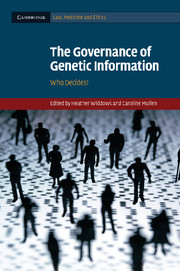Book contents
- Frontmatter
- Contents
- Notes on contributors
- Preface
- Introduction
- SECTION I Problematising governance of genetic information
- SECTION II Ethical frameworks of governance
- 4 Constructing communal models of governance: collectives of individuals or distinct ethical loci?
- 5 Rights, responsibility and stewardship: beyond consent
- 6 Who decides what? Relational ethics, genetics and well-being
- SECTION III Redesigning governance
- Bibliography
- Index
5 - Rights, responsibility and stewardship: beyond consent
Published online by Cambridge University Press: 02 February 2010
- Frontmatter
- Contents
- Notes on contributors
- Preface
- Introduction
- SECTION I Problematising governance of genetic information
- SECTION II Ethical frameworks of governance
- 4 Constructing communal models of governance: collectives of individuals or distinct ethical loci?
- 5 Rights, responsibility and stewardship: beyond consent
- 6 Who decides what? Relational ethics, genetics and well-being
- SECTION III Redesigning governance
- Bibliography
- Index
Summary
With the prospect of an improved understanding of human genetics (as well as an accelerating application of that understanding), it is important that regulators should strike the right balance between support for the health care community (broadly conceived) and respect for the wider community's guiding values. Under conditions of ethical pluralism, this is no simple matter; for regulators will be presented with a variety of (oft en irreconcilable) demands. For present purposes, let me focus on and contrast just two ethics – one prioritising private right, the other public good; one prioritising the autonomy of individuals, the other the good of the community; one putting a premium on informed consent, the other largely discounting or dispensing with consent (informed or otherwise).
The former ethic, strongly supported by the rights-respecting trajectory of mainstream modern bioethics, presents itself as an essential counterweight to medical paternalism and scientific ambition. So influential has this ethic become that it is now treated as axiomatic that individuals have, so to speak, a sovereign right to make informed choices about their treatment as well as about participating in research trials or studies. According to this ethic, if patients or prospective participants say ‘no’, then medicine and science must be put on hold. By contrast, the latter ethic asserts itself in contexts where a gain can be made either without impinging on the ‘interests’ of an individual (for example, by conducting research on human embryos, or by retrieving cadaveric organs for transplantation), or without impinging on the more important life and- death interests of individuals (for example, by making body tissues removed in the course of surgery, biological samples or personal data more freely available to researchers).
- Type
- Chapter
- Information
- The Governance of Genetic InformationWho Decides?, pp. 99 - 125Publisher: Cambridge University PressPrint publication year: 2009
- 4
- Cited by



